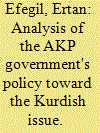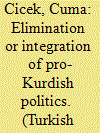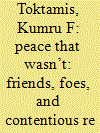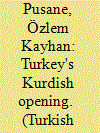|
|
|
Sort Order |
|
|
|
Items / Page
|
|
|
|
|
|
|
| Srl | Item |
| 1 |
ID:
105388


|
|
|
|
|
| Publication |
2011.
|
| Summary/Abstract |
The Kurdish issue emerged as a result of the Kemalist modernization policy. For many years Kurds and other groups were forced to absorb Turkish values and culture instead of developing their own local identities. For this reason, Kurdish uprisings occurred. By describing these uprisings as ethnic separatist movements, the government authorities instituted military measures against Kurdish groups in order to suppress their demands. But, for the first time in 1992 former President Turgut Özal accepted the reality of the Kurdish issue rather than describing it as an ethnic separatist movement. Accordingly, he suggested taking social, political and cultural measures as supplements to military operations. Özal's approach has been seriously taken up by the AKP government. As opposed to traditional policy, the existing government has noted that the problem emerged from violation of democratic rights of Kurdish people by state authorities and advocated that serious measures be taken to improve the socio-economic conditions in Southeastern Anatolia. The AKP government took considerable steps to improve democratic conditions in Turkey despite the PKK attack on the Dag(l?ca gendarme station on October 21, 2007. Permission to freely use the Kurdish language and changing the names of some towns back to original Kurdish were some of the results. But the military elites, the opposition parties - the CHP and the MHP - and the Kurdish-originated PDP party opposed the government's policy. Still, in order to find a peaceful solution to the question, the government has to make fundamental constitutional amendments in order to improve conditions and guarantee the rights of Kurdish people. In the meantime, it has to take serious steps to improve socio-economic conditions in the region as well as disarm the PKK terrorists.
|
|
|
|
|
|
|
|
|
|
|
|
|
|
|
|
| 2 |
ID:
105387


|
|
|
|
|
| Publication |
2011.
|
| Summary/Abstract |
The new geopolitical conditions and the regional seeking of neoliberal, pro-Islamist politics facilitate the ending of the Kurdish conflict in Turkey and to rebuild political relation with the Iraqi Kurds. Besides, the rise of pro-Kurdish politics both within Turkey and Iraq has nearly closed the door on the sustainability of the traditional security policy. However, the AKP's Turkish nationalist ideological-political character, the lack of the deep democratic values in the political tradition of neoliberal pro-Islamic politics and its weak administrative capacity about the Kurdish issue have prevented it from going beyond the traditional national security policy to solve the Kurdish issue and to disarm the PKK.
|
|
|
|
|
|
|
|
|
|
|
|
|
|
|
|
| 3 |
ID:
172504


|
|
|
|
|
| Summary/Abstract |
In 2009–2015, the Justice and Development Party (AKP) put forward several initiatives to end insurgency in Kurdish majority areas. However, successive “openings” failed to make progress. The electoral and international goals of the AKP gradually became incongruent with the peace process, and the AKP espoused heavy-handed tactics in July 2015. The ups and downs of the process in 2009–2015 show that it was already fragile. Some causes of this fragility were external to the AKP, such as the opposition parties’ eagerness to use the process to poach nationalist voters and the PKK’s violence. However, I argue that the contradictory nature of the AKP’s narrative was also a crucial factor. The party’s earlier narrative required the strict separation of two layers: security policies to fight terrorists and democratization policies to address the legitimate grievances of citizens. However, the intersubjective strategies that it experimented later required a gray area between these two fields. The AKP, instead of changing strategies, has constructed a three-layered, contradictory narrative.
|
|
|
|
|
|
|
|
|
|
|
|
|
|
|
|
| 4 |
ID:
161144


|
|
|
|
|
| Summary/Abstract |
Moderation theory, within the political party context, has often been applied to European Socialists and Christian Democrats, as well as Islamic revivalists in the Muslim world. This article applies moderation theory to the Kurdish left of Turkey, namely the Peoples’ Democratic Party (HDP). The HDP’s electoral breakthrough in June 2015 elections carried the potential for this party to transform itself into a larger and moderate actor. Nevertheless, the repeat elections of November 2015 weakened the HDP’s prospects as the ruling AKP won enough seats to reconstitute a single-party government. This article puts forth three major explanations for the recent moderation of the Kurdish left: first, the then ongoing peace (resolution) process between the Turkish government and Kurdish actors; second, the ‘Demirtaş factor’, the personality and politics of Selahattin Demirtaş, the HDP’s co-chair; and finally, the HDP’s direct confrontation with President Erdoğan in both electoral and political terms in the 2015 general elections.
|
|
|
|
|
|
|
|
|
|
|
|
|
|
|
|
| 5 |
ID:
161143


|
|
|
|
|
| Summary/Abstract |
This essay explores the relationship between the collapse of negotiations between Turkey and the PKK and the rupture between the governing AKP and its former ally, the Cemaat or Gülen Movement. This schism transformed both the AKP regime and Kurdish politics. This article traces the shifting narratives of key actors in this process. It also identifies the multifaceted underpinnings of the political violence that erupted and disrupted the resolution/peace process. In the end, the peace/resolution process was a (re)entrenchment, or inadvertent re-positioning of violent means of suppression against Kurdish politics in Turkey, beyond the particular intentions, beliefs, ideas and attitudes of all parties.
|
|
|
|
|
|
|
|
|
|
|
|
|
|
|
|
| 6 |
ID:
161141


|
|
|
|
|
| Summary/Abstract |
Kurdish politics in the Middle East and within the boundaries of states where Kurdish speaking populations live, is a highly complicated, multi-layered and multi-faceted issue. In this special issue, our focus is mainly on Kurdish politics in Turkey, especially in the past fifteen years under the AKP regime, which can be considered as a dynamic episode of state-formation and (de-) democratization onto itself. This introductory piece briefly reviews some aspects of Kurdish politics in Turkey and previews the articles in this special issue.
|
|
|
|
|
|
|
|
|
|
|
|
|
|
|
|
| 7 |
ID:
129561


|
|
|
|
|
| Publication |
2014.
|
| Summary/Abstract |
Turkish state actors have used mainly military means to first suppress the Kurdish rebellions and then to end the PKK violence from 1984 onwards. However, after the AKP came to office in 2002, the government challenged the hardline state policy and initiated a Kurdish opening. This policy has the ultimate goal of disarming the PKK and resolving the Kurdish question. However, the Kurdish opening so far has failed to bring about the desired policy outcomes because the parties to the Kurdish question have been highly divided on the side of both the state and the Kurds in Turkey.
|
|
|
|
|
|
|
|
|
|
|
|
|
|
|
|
|
|
|
|
|